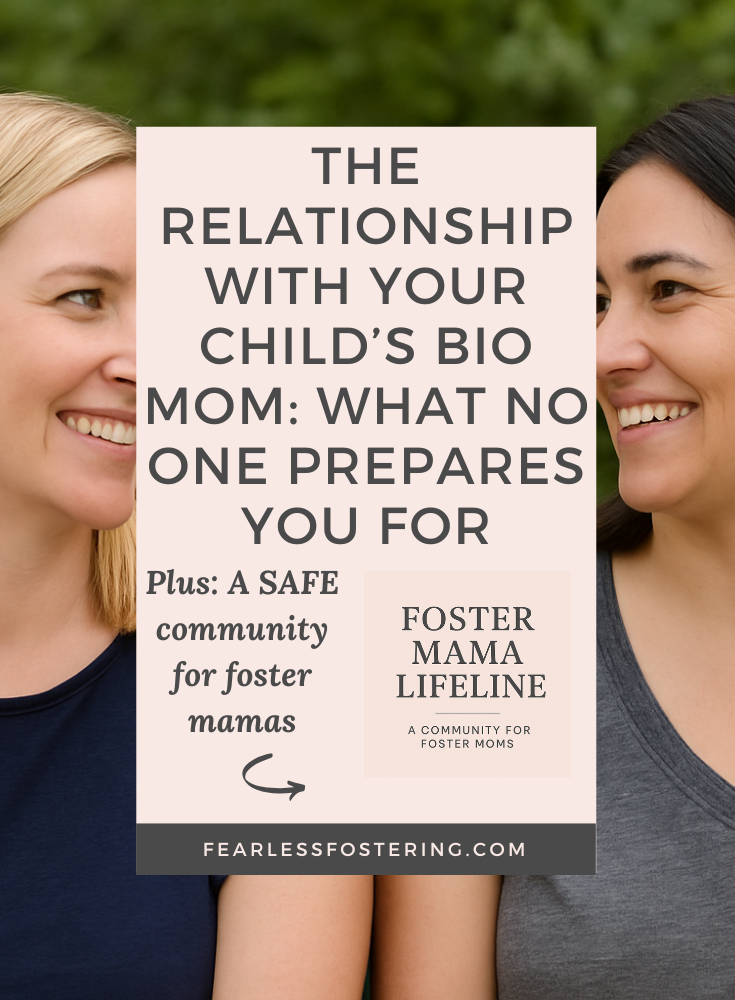
When you begin your foster care journey, you prepare for a lot of things.
You prepare your home.
You prepare your heart.
You prepare for trauma, transitions, and the unknown.
But almost no one prepares you for one of the most sacred, painful, complex, and often overlooked relationships in foster care:
The relationship between you and your child’s biological mother.
Let’s talk about it—with tenderness, honesty, and deep respect. Not with gossip. Not with blame. But with the kind of compassion that foster moms often need—and rarely receive.
The Invisible Layer of Foster Parenting
Most people think foster parenting is about loving the child in front of you—and of course, it is.
But the full picture is more layered.
Because when you say “yes” to that child, you also say “yes” to their story.
Their loss.
Their trauma.
And—whether directly or indirectly—their first family.
You might never meet your child’s biological mom.
Or you might see her regularly.
You might experience kindness, anger, deep sadness, or silence.
And even when you’re not in direct contact, you’re still aware of her.
Because how can you not be?
You’re raising her child.
You’re guiding them through bedtime and bath time and big feelings.
You’re being called “Mom,” knowing someone else once was—and maybe still is.
It’s a strange, sacred, and emotionally loaded space.
What Grief Can Look Like
One of the most important things I’ve learned is this:
Grief doesn’t always look like sadness.
Sometimes it looks like silence.
Sometimes it looks like anger.
Sometimes it looks like distance, withdrawal, or deflection.
And sometimes it lands right on you.
Even when you’ve followed every protocol.
Even when you’ve shown kindness and compassion.
Even when you’ve done everything “right.”
That grief still exists.
And often, you become the visible representation of what’s been lost.
It’s not your fault.
But it doesn’t mean it doesn’t hurt.
The Emotional Tension No One Talks About
People talk about trauma behaviors.
They talk about court dates and case plans.
They talk about how to bond with your foster child.
But what they don’t always talk about is the emotional weight of caring deeply for a child while honoring the woman they came from.
There’s often no roadmap for this relationship.
No checklist or training covers what to say, how to feel, or how to navigate those complicated layers.
You may wonder:
-
Am I saying too much?
-
Am I saying too little?
-
Should I be reaching out more—or less?
-
Is it okay that I feel hurt by her silence or rejection?
-
Is it disloyal to love this child as my own?
These are big questions. And if you’ve asked them—you’re not alone.
It’s Still Tender
Even years into this journey, there are moments when it all rises to the surface.
Not in dramatic or chaotic ways—but in quiet, emotional waves.
Maybe it’s Mother’s Day.
Maybe it’s a milestone.
Maybe it’s a simple question from your child that stops you in your tracks.
The emotions don’t go away.
They soften. They shift. But they remain tender.
Because foster care didn’t just expand my heart—it changed it.
It asked me to hold grief and gratitude at the same time.
To speak of love in layered ways.
To make peace with stories that may never be wrapped in a bow.
How We Speak About Her in Our Home
One of the most sacred parts of this journey is how we speak about our children’s first mom in our home.
We don’t pretend everything was easy or pain-free.
But we also don’t erase her.
We honor her humanity.
We speak her name with care.
We remind our kids they never have to choose between loving her and loving us.
There’s room for both.
Because love doesn’t require erasure—it requires expansion.
If You’re In the Middle of It
If you’re currently navigating a relationship (or absence of one) with your child’s bio mom, here’s what I want you to know:
1. You’re not doing it wrong.
This is hard. Emotionally layered. Spiritually stretching. And there’s no script.
2. You can honor her without abandoning yourself.
Compassion doesn’t mean boundary-less. You can show respect and still protect your emotional safety.
3. It’s okay to grieve what the relationship isn’t.
Sometimes we hope for connection, clarity, or closure that never comes. That deserves space too.
4. Healing is possible—even if it doesn’t look how you imagined.
Sometimes it’s an unexpected email.
Sometimes it’s quiet peace.
Sometimes it’s simply learning to hold space without bitterness.
You’re Doing Sacred Work
Foster care will stretch your heart in ways you didn’t expect.
And this part—the relationship between you and your child’s bio mom—is one of the most stretching pieces.
But it’s also one of the most sacred.
Because when you hold space for love, loss, grief, and healing all at once—you’re modeling something powerful.
You’re showing your child that relationships can be complicated and still beautiful.
That love can coexist with boundaries.
That empathy is stronger than fear.
And you’re doing it all while walking a path most people will never fully understand.
If You Need Support
You don’t have to carry this emotional weight alone.
If you’re looking for steady, weekly support from someone who gets the emotional layers of this journey, I created the Foster Mama Lifeline for you.
Inside, you’ll find:
-
Trauma-informed tools and encouragement
-
Gentle, real-life coaching
-
A community of foster and adoptive moms who are navigating the same tender spaces
It’s not about perfection.
It’s about presence.
It’s about remembering you’re not alone.
🖤 Click here to join the Foster Mama Lifeline.
You are not failing.
You are doing brave, beautiful, deeply sacred work.
And I’m so glad you’re here.
+ show Comments
- Hide Comments
add a comment